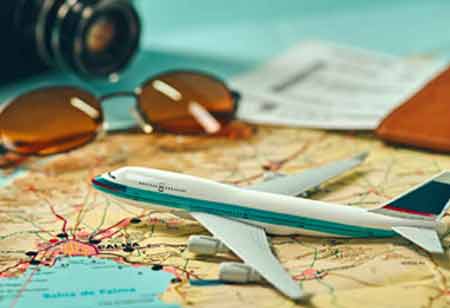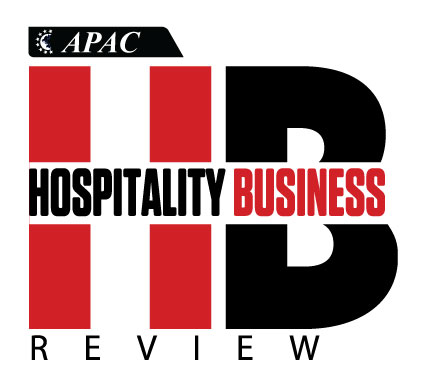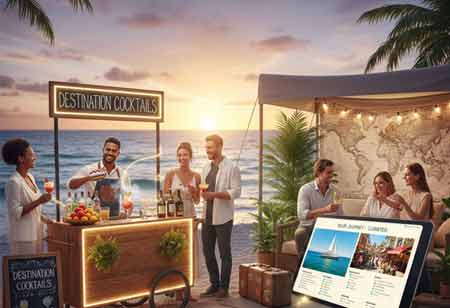Thank you for Subscribing to Hospitality Business Review Weekly Brief
The Development and Approaches of Marketing Services for Travel and Tourism
Travel marketing evolves through digital innovation, personalization, storytelling, and sustainability to engage modern travelers and adapt to global changes.

By
Hospitality Business Review | Monday, November 10, 2025
Stay ahead of the industry with exclusive feature stories on the top companies, expert insights and the latest news delivered straight to your inbox. Subscribe today.
Travel and tourism are among the most thriving sectors of the global economy and contribute significantly to GDPs worldwide. Technological advancements, shifting consumer preferences, and globalization have all played a part in the industry's remarkable ascent. In this regard, influencing travel decisions, cultivating brand loyalty, and shaping consumer perceptions all depend on travel and tourism marketing services. Effective marketing strategies can help destinations, hospitality businesses, and travel service providers attract and retain customers while overcoming challenges including competition, seasonality, and economic fluctuations.
Historically, travel marketing was limited to print advertisements, travel brochures, and word-of-mouth recommendations. However, the digital revolution has transformed how travel experiences are marketed and consumed. The rise of the internet, social media, and mobile technology has enabled personalized, data-driven marketing strategies that cater to specific consumer preferences. Earlier, travel agencies dominated the landscape, acting as intermediaries between travelers and service providers. With the advent of online booking platforms like Expedia, Airbnb, and Booking.com, travelers now have direct access to vast amounts of information and choices. Consequently, travel marketing strategies have evolved to include sophisticated digital campaigns, influencer collaborations, and user-generated content to engage modern travelers effectively.
Digital marketing has become indispensable in the travel and tourism sector. Social media platforms such as Instagram, Facebook, and TikTok serve as powerful tools for showcasing destinations and experiences through visually compelling content. Influencer marketing, where social media personalities share their travel experiences, has proven effective in building trust and inspiring wanderlust among followers.
Search engine optimization (SEO) and content marketing also play a crucial role in travel marketing. Companies invest in high-quality blogs, travel guides, and video content to attract organic traffic and position themselves as industry leaders. Email marketing and personalized recommendations based on user behavior further enhance customer engagement, ensuring that travel brands remain top-of-mind.
Personalization has emerged as a key differentiator in travel and tourism marketing. Advances in artificial intelligence (AI) and big data analytics enable companies to tailor marketing messages based on user behavior, preferences, and demographics. Personalized recommendations, dynamic pricing, and customized travel itineraries enhance customer satisfaction and conversion rates.
For instance, AI-powered chatbots and virtual assistants provide real-time travel suggestions and customer support, streamlining the booking process. Machine learning algorithms analyze past travel patterns to offer targeted promotions, loyalty rewards, and exclusive deals, fostering repeat business.
Storytelling is a fundamental aspect of travel and tourism marketing. Compelling narratives evoke emotions, making destinations and experiences more relatable and desirable. Brands leverage storytelling through immersive video content, customer testimonials, and experiential marketing campaigns.
For example, tourism boards create cinematic promotional videos that highlight cultural heritage, adventure opportunities, and local attractions. Hotels and resorts use guest stories to showcase exceptional service and unique experiences, reinforcing their brand identity.
Sustainability has become a critical factor influencing travel decisions. Conscious travelers seek eco-friendly accommodations, responsible tourism activities, and ethical travel experiences. Consequently, marketing strategies now emphasize sustainability initiatives such as carbon offset programs, conservation efforts, and communitybased tourism.
Brands that integrate sustainability into their marketing not only attract environmentally conscious travelers but also enhance their reputation. Certifications like LEED (Leadership in Energy and Environmental Design) and partnerships with non-profits help businesses demonstrate their commitment to sustainable tourism.
The COVID-19 pandemic significantly disrupted the travel and tourism industry, forcing marketers to adapt their strategies. Travel restrictions, health concerns, and changing consumer behaviors necessitated a shift toward safety-centric messaging. Destinations and travel brands focused on reassuring travelers through hygiene protocols, flexible booking policies, and virtual travel experiences. As the industry recovers, hybrid marketing strategies combining digital innovation and personalized engagement are shaping the new normal. The rise of remote work and “workation” trends has also influenced travel marketing, with brands promoting long-term stays and co-working-friendly accommodations.
Looking ahead, emerging technologies will continue to redefine travel marketing. Augmented reality (AR) and virtual reality (VR) enable travelers to explore destinations virtually before making a booking decision. Blockchain technology enhances transparency in travel transactions, reducing fraud and improving customer trust. The integration of voice search and smart assistants like Amazon Alexa and Google Assistant further influences travel planning. Brands optimizing their content for voice search queries gain a competitive edge in capturing consumer attention.
The travel and tourism industry is an ever-evolving sector that requires innovative marketing approaches to engage modern travelers. Digital transformation, personalization, storytelling, sustainability, and emerging technologies shape the future of travel marketing services. Companies that embrace these trends and adapt to changing consumer behaviors will thrive in an increasingly competitive market. As the world gradually recovers from the impact of the pandemic, travel marketers must continue to deliver value-driven, inspiring, and ethical marketing strategies to reignite the spirit of exploration.







